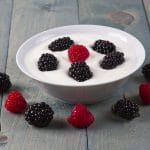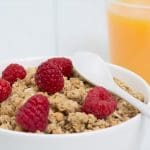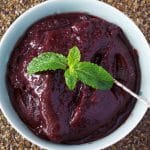Raspberry Facts:

Nutrition Facts
Serving Size 1 Cup
Servings Per Container 1
Amount Per Serving
Calories 64
Calories from Fat 9
% Daily Value*
Total Fat 1g
2%
Saturated Fat 0g
0%
Trans Fat 0g
Cholesterol 0mg
0%
Sodium 1mg
0%
Total Carbohydrate 15g
5%
Dietary Fiber 8g
32%
Sugars 5g
Protein 1g
Vitamin A
1%
Vitamin C
54%
Calcium
3%
Iron
5%
Vitamin E
5%
Vitamin K
12%
Thiamin
3%
Riboflavin
3%
Niacin
4%
Vitamin B6
3%
Folate
6%
Pantothenic Acid
4%
Magnesium
7%
Phosphorus
4%
Potassium
5%
Zinc
3%
Copper
6%
Manganese
41%
*Percent Daily Values are based on a 2,000 calorie diet. Your daily values may be higher or lower depending on your calorie needs.
PQ (Protein Quality) x PDCAAS (Protein Digestibility Corrected Amino Acid Score) - N/A
Additional Contents
- lutein
- tannins
- catechin
- cyanidin
- sanguiin
- malvidin
- flavonols
- tiliroside
- quercetin
- rheosmin
- gallic acid
- zeaxanthin
- ellagic acid
- caffeic acid
- ferulic acid
- resveratrol
- kaempferol
- delphinidin
- vanillic acid
- pelargonidin
- ellagitannins
- beta-carotene
- alpha-carotene
- lambertianin C
- coumaric acids
- chlorogenic acid
- proanthocyanidins
- hydroxycinnamic acids
- complex carbohydrates
Potential Health Benefits
- powerful cardiovascular disease protection
- powerful blood glucose management
- powerful anti-cancer properties
- increased skin & eye UV damage protection
- digestive system health boost
- immune system health boost
- lower "bad" cholesterol
- promote weight-loss
- energy boost
- antioxidant
Potential Athletic Benefits
- Improve blood glucose levels for more sustained energy throughout training sessions.
- Protect against cardiovascular decline from aging to preserve long-term health and fitness levels.
- Help protect skin and eyes from UV exposure damage and the degenerative effects of aging.
- Boost exercise energy levels from complex carbohydrates and phytochemical intake.
Glycemic Index Rank
26 out of 100
| Rank | Value |
|---|---|
| Low Glycemic | less than 55 |
Food Sensitivity Rank
1.2 to 1 ratio
| Rank | Value |
|---|---|
| Low-Medium for Fructose Sensitivity | more than 1 (fructose to glucose ratio) |
A special berry indeed, raspberries are phytonutrient powerhouses. They contain over 23 known species of phytochemicals that may help to provide powerful anti-cancer properties, cardiovascular disease protection, and more. Raspberries are very beneficial to the general population (unless you react negatively to them) and are also great substitutes for a sweet snack.
- Anti-Obese Action of Raspberry Ketone
- Identification and Dietary Relevance of Antioxidants from Raspberries
- Raspberry Ketone Increases Both Lipolysis and Fatty Acid Oxidation in 3T3-L1 Adipocytes
- Comparison of Antioxidant Capacity and Phytochemical Properties of Wild and Cultivated Red Raspberries
- Anthocyanin Content, Antioxidant, Anti-Inflammatory, and Anti-Cancer Properties of Blackberry and Raspberry Fruits

rheosmin
is an organic substance also referred to as a raspberry ketone. Rheosmin has been studied and shown to help increase the metabolism of fat cells within our body and may also help to decrease the absorption of new dietary fat from food.
Sources include: USDA
***All-Body Fitness takes no responsibility for the accuracy of the information provided above. Please contact a medical doctor or a registered dietitian for nutrition advice.




